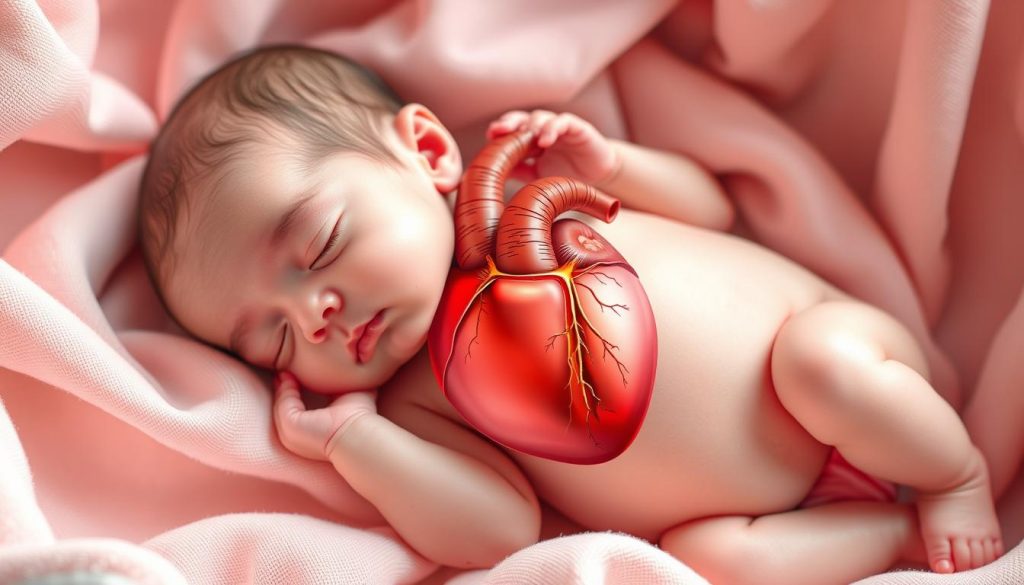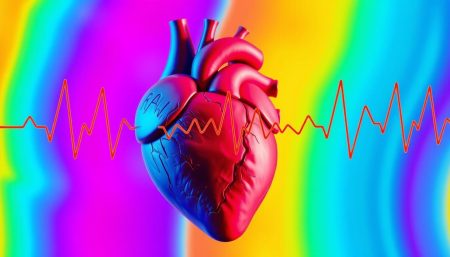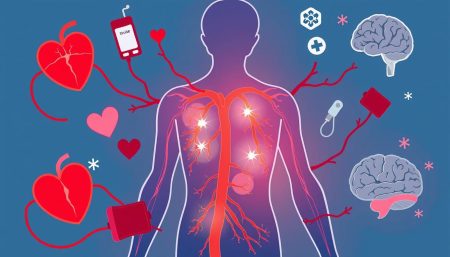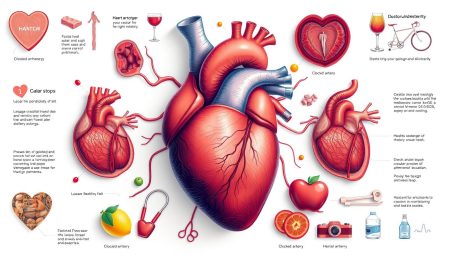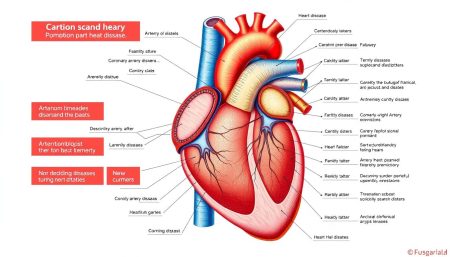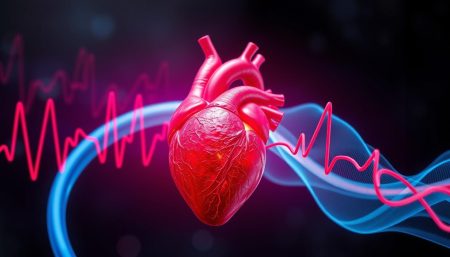Birth heart conditions can be puzzling for parents and doctors. When a newborn faces heart challenges, many questions come up. Is a congenital heart defect the same as a cardiovascular disease? This is a common question.
Congenital heart defects happen in about 1% of births each year. They affect the heart’s structure from birth. These heart defects in newborns can be simple or very complex. Knowing if they are part of cardiovascular diseases is key for treatment.
In this article, we’ll dive into congenital heart defects. We’ll look at how they fit into cardiovascular diseases. This is important for those affected and their families. Let’s understand these birth heart conditions better and their effect on heart health over time.
Understanding Congenital Heart Defects as Cardiovascular Conditions
Congenital cardiac abnormalities are heart problems that babies are born with. These issues affect how well the heart works. They impact the whole cardiovascular system.
Definition and Classification of Heart Defects
Heart problems at birth include many types of structural issues. They can affect the heart’s chambers, valves, or blood vessels. Doctors sort these defects by where they are and how serious they are.
Relationship to Cardiovascular System
Congenital heart defects really affect the cardiovascular system. They can mess up blood flow, oxygen supply, and heart function. This makes them a key part of cardiovascular diseases.
Medical Classification Categories
Doctors use certain categories to classify congenital heart defects. These categories help with diagnosis, treatment plans, and research.
| Category | Description | Examples |
|---|---|---|
| Cyanotic Defects | Cause bluish skin due to low oxygen | Tetralogy of Fallot, Transposition of Great Arteries |
| Acyanotic Defects | Do not cause skin color changes | Atrial Septal Defect, Ventricular Septal Defect |
| Obstructive Defects | Partially or fully block blood flow | Pulmonary Stenosis, Aortic Stenosis |
Knowing these categories helps doctors give better care for heart problems at birth. It also helps predict how a person will do in the long run and what care they’ll need later.
Types of Heart Defects Present at Birth
Heart defects in infants vary, affecting different parts of the heart. These can range from minor to severe, impacting a child’s health and growth.
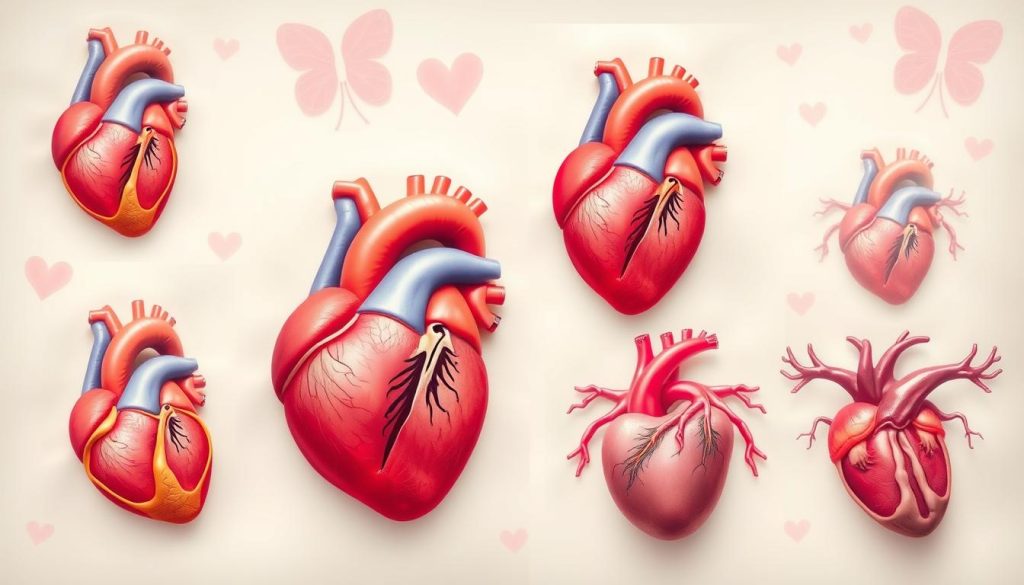
Septal defects are common at birth. They happen when there’s a hole between the heart’s chambers. Atrial septal defects affect the upper chambers, while ventricular septal defects involve the lower chambers.
Valve abnormalities are another type of congenital heart defect. These include pulmonary stenosis, where the valve between the heart and lungs doesn’t open fully. Aortic stenosis affects the valve connecting the heart to the body’s main artery.
Complex heart defects in infants involve multiple issues. Tetralogy of Fallot is one such condition, combining four different heart abnormalities. It causes oxygen-poor blood to flow from the heart to the body, leading to a bluish skin color.
- Patent ductus arteriosus: A persistent opening between two major blood vessels
- Coarctation of the aorta: A narrowing of the main artery carrying blood to the body
- Transposition of the great arteries: The two main arteries leaving the heart are reversed
Understanding these heart problems at birth is key for early detection and treatment. Each defect needs specific medical attention and care strategies. This ensures the best outcomes for affected infants.
Common Signs and Symptoms of Congenital Heart Abnormalities
It’s important to spot the signs of heart defects in newborns early. These conditions can show up in many ways, from mild to serious. Knowing these signs helps parents get help fast.
Physical Symptoms in Newborns
Babies with heart problems might show physical signs:
- Bluish tint to skin, lips, or fingernails
- Rapid breathing or shortness of breath
- Poor weight gain
- Swelling in the legs, abdomen, or around the eyes
- Fatigue during feeding
Behavioral Changes in Infants
Heart issues in newborns can also affect their behavior:
- Irritability or fussiness
- Lethargy or sleepiness
- Difficulty feeding
- Sweating, specially during feeding
Warning Signs for Parents
Parents should look out for these signs in their babies:
- Persistent cough or wheezing
- Fainting or dizzy spells
- Unexplained fevers
- Lack of energy or tiring easily during play
If you see any of these signs, see a pediatrician right away. Catching heart problems early can help a lot. It ensures the right care for heart issues from birth.
Is Congenital Heart Defect a Cardiovascular Disease?
Congenital heart defects are a type of cardiovascular disease. They affect the heart’s structure and function from birth. They are different from heart conditions that develop later, but they are part of the cardiovascular disease family.
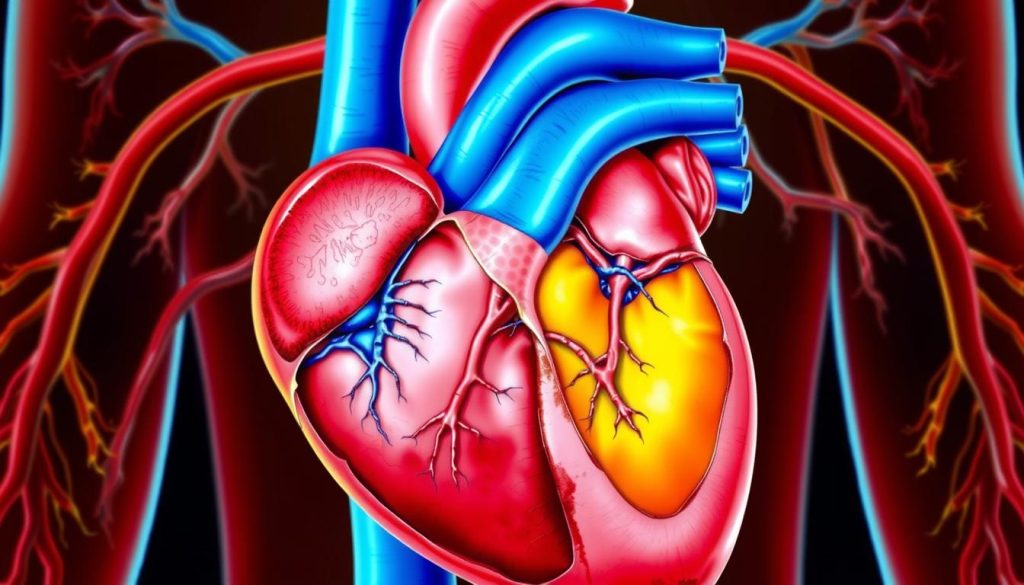
Doctors group congenital heart defects with cardiovascular diseases. This is because they impact the heart and blood vessels. These defects can be simple or very complex, needing ongoing care.
The link between congenital heart defects and heart health is strong. People born with heart defects often face long-term heart problems. These can include:
- Increased risk of heart failure
- Abnormal heart rhythms
- Pulmonary hypertension
- Endocarditis (heart infection)
It’s important to understand this connection for proper care. Those with congenital heart defects need lifelong cardiovascular care. This care includes monitoring heart health, preventing problems, and treating new heart issues.
| Aspect | Congenital Heart Defects | Other Cardiovascular Diseases |
|---|---|---|
| Onset | Present at birth | Develop over time |
| Cause | Genetic or developmental factors | Lifestyle, age, or other health conditions |
| Treatment Approach | Often requires early intervention | May focus on prevention and management |
In conclusion, congenital heart defects are a unique part of cardiovascular disease. Recognizing them as such helps ensure they get the right care within the cardiovascular health system.
Diagnostic Methods for Birth Heart Conditions
Finding heart defects in infants early is key for good treatment. Doctors use many ways to spot heart issues in babies, before and after birth. These methods help find heart problems right at birth and guide the right care.
Prenatal Screening Tests
Prenatal tests can show heart problems before a baby is born. Fetal echocardiograms use sound waves to make detailed heart images. This test can find many heart defects in infants as early as 18 weeks into pregnancy.
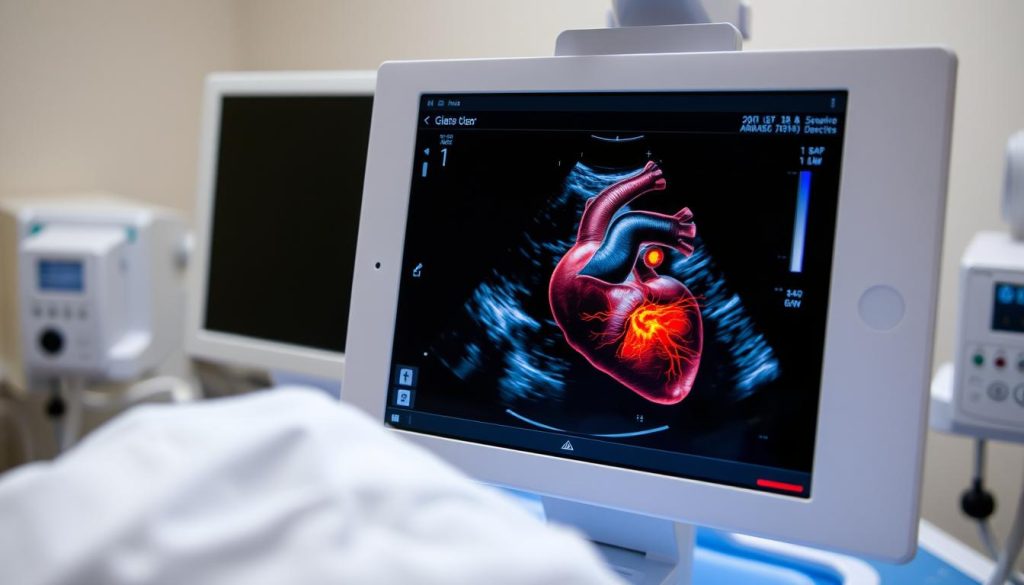
Postnatal Diagnostic Procedures
After birth, doctors use various tests to check for heart diseases. These include:
- Physical exams
- Pulse oximetry to measure blood oxygen levels
- Electrocardiograms (ECGs) to check heart rhythm
- Chest X-rays to view heart size and shape
Advanced Imaging Techniques
For complex heart issues at birth, advanced imaging gives detailed views. These include:
| Technique | Description | Benefits |
|---|---|---|
| Cardiac MRI | Uses magnetic fields to create 3D heart images | Detailed view of heart structure and function |
| CT Angiography | X-ray based imaging of blood vessels | Shows blood flow patterns in the heart |
| 3D Echocardiography | Advanced ultrasound technique | Provides real-time 3D views of the heart |
These tools help doctors accurately find heart defects in infants. Early detection means early treatment, which helps babies with heart conditions a lot.
Risk Factors and Genetic Components
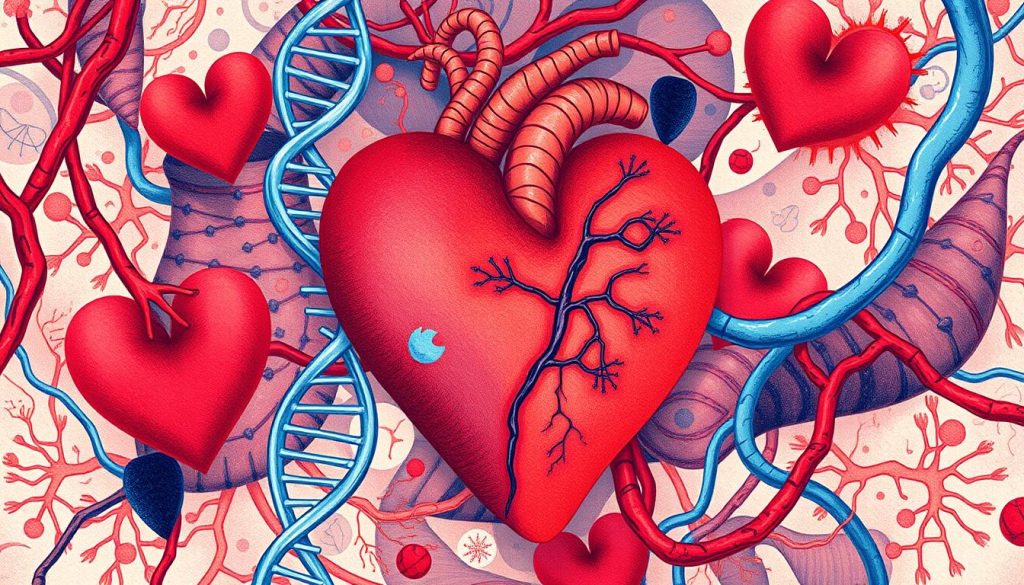
It’s important for expectant parents and doctors to know about risk factors for heart problems at birth. These issues can come from genes or the environment.
Genes play a big part in many heart defects passed down through families. If a family member has a heart defect, the baby might too. This is why family history is so important.
“Genetic testing has revolutionized our approach to identifying and managing congenital heart defects before birth.”
Things around us can also affect a baby’s heart. For example, if a mom has diabetes or is overweight, it might raise the risk. Drinking alcohol or smoking while pregnant can also harm the baby’s heart.
- Advanced maternal age
- Viral infections during pregnancy
- Exposure to toxic substances
Getting regular prenatal care is key to spotting heart problems early. This way, doctors can plan the best treatment for the baby.
Even though we can’t control all risks, knowing about them helps. Early care and genetic counseling are vital in dealing with heart issues at birth.
Treatment Options for Cardiac Malformations
Managing heart defects in newborns needs a team effort. The treatment plan depends on the defect’s type and severity. Let’s look at the main ways to address congenital cardiac abnormalities.
Surgical Interventions
Surgery is often needed to fix heart defects in newborns. These surgeries aim to repair or rebuild heart structures. Some common surgeries include:
- Septal defect closure
- Valve repair or replacement
- Artery or vein reconstruction
The timing of surgery depends on the infant’s condition and the urgency of the defect.
Medication Management
Medications are key in managing heart defects from birth. They help:
- Control heart rate and rhythm
- Improve blood flow
- Reduce fluid buildup
Doctors carefully choose medications based on each child’s needs.
Lifestyle Modifications
Families of children with heart defects need to make lifestyle changes. These may include:
- Special feeding techniques for infants
- Activity restrictions as the child grows
- Regular medical check-ups and monitoring
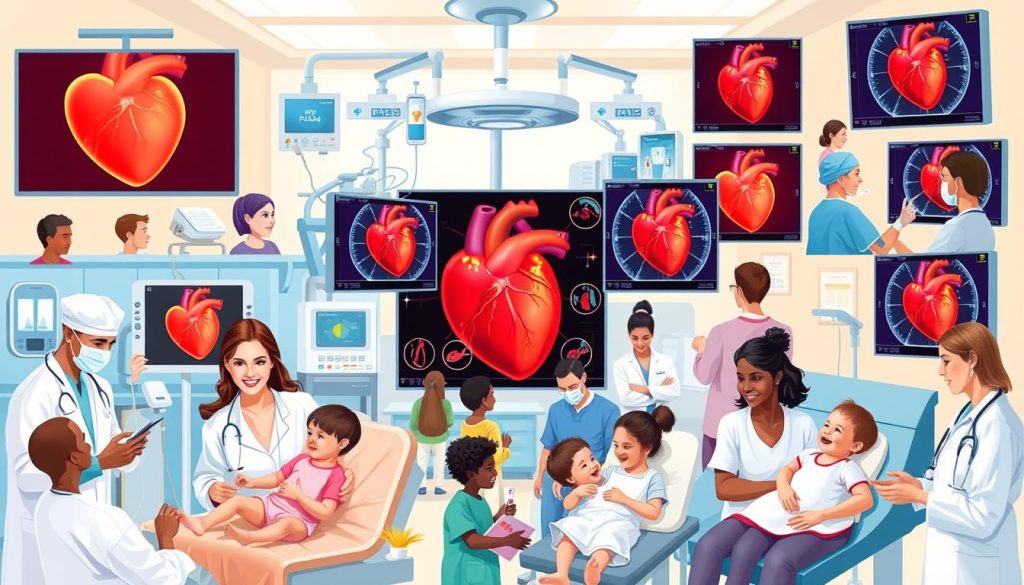
| Treatment Type | Examples | Benefits |
|---|---|---|
| Surgery | Septal defect closure, Valve repair | Corrects structural abnormalities |
| Medication | Beta-blockers, Diuretics | Manages symptoms, Improves heart function |
| Lifestyle Changes | Special feeding, Activity adjustments | Supports overall health, Prevents complications |
Long-term Prognosis and Quality of Life
Living with a congenital heart defect can be tough. But, thanks to medical progress, the outlook has gotten much better. Now, many people born with heart issues can live full and happy lives.
Even so, those with congenital heart defects often need to stay on top of their health. They might need regular doctor visits and sometimes more treatments. Some may have to limit their physical activities or take medicine for life.
The effect on quality of life varies a lot. Some people with heart defects do great things like going to school, getting jobs, and starting families. Support groups and resources are key in helping them deal with the emotional side of their condition.
With the right care, many people with congenital heart defects have a good future ahead. Research keeps getting better, aiming to improve treatments and life expectancy. This gives hope for a better quality of life for those with this heart condition.
FAQ
Q: Is a congenital heart defect considered a cardiovascular disease?
A: Yes, congenital heart defects are cardiovascular diseases. They are heart problems present at birth. These problems affect the heart’s function and blood flow.
Q: What are the most common types of congenital heart defects?
A: Common types include septal defects (heart holes) and valve problems. There are also more complex issues like Tetralogy of Fallot. Each type impacts the heart differently, from mild to severe.
Q: How are congenital heart defects diagnosed?
A: They are diagnosed through prenatal tests like fetal echocardiograms. Postnatal tests include physical exams and blood tests. Advanced imaging like MRI and CT scans are also used.
Q: Can congenital heart defects be treated?
A: Yes, many can be treated. Treatments include surgery, medication, and lifestyle changes. The treatment plan depends on the defect’s type and severity.
Q: Are congenital heart defects hereditary?
A: Some have a genetic link and can run in families. But many occur without a clear genetic cause. Environmental factors and maternal health also play a role.
Q: What are the signs of a congenital heart defect in newborns?
A: Signs include bluish skin (cyanosis) and rapid breathing. Poor feeding and fatigue are also signs. It’s important to seek medical help if you notice any concerns.
Q: What is the long-term outlook for individuals with congenital heart defects?
A: The outlook varies by defect type and severity. Many lead normal lives with treatment. But some face ongoing challenges. Medical care has improved outcomes over time.
Q: How do congenital heart defects impact quality of life?
A: The impact varies. Some face physical limits or need ongoing care. But many live fulfilling lives with proper management. Support from healthcare, family, and groups is key.
Q: Can adults develop congenital heart defects?
A: Adults can have heart defects present at birth that weren’t diagnosed. Those treated as children may face health issues later.
Q: Are there any preventive measures for congenital heart defects?
A: Preventive measures include good maternal health and avoiding harmful substances. Managing chronic conditions and genetic counseling can also help.












